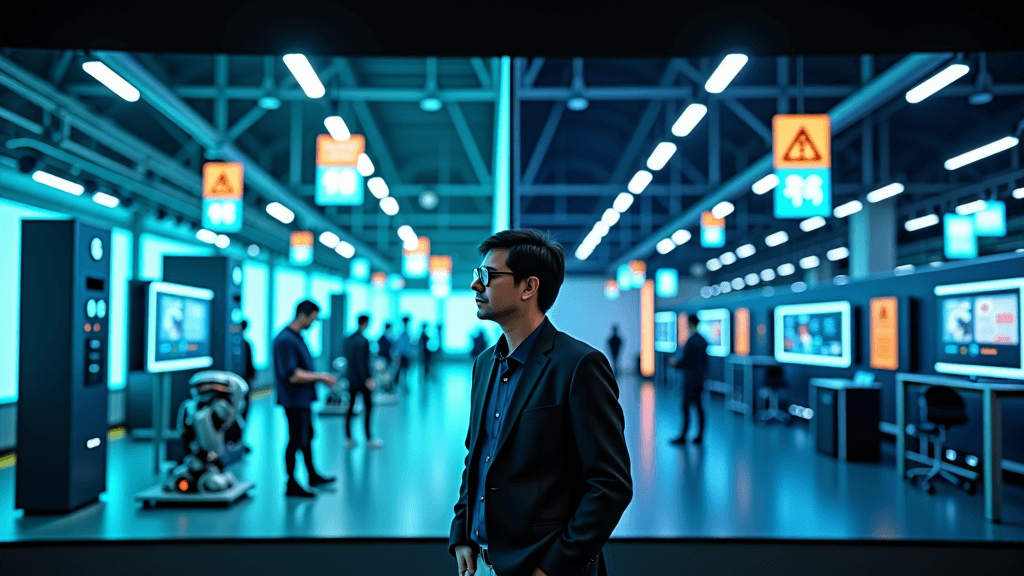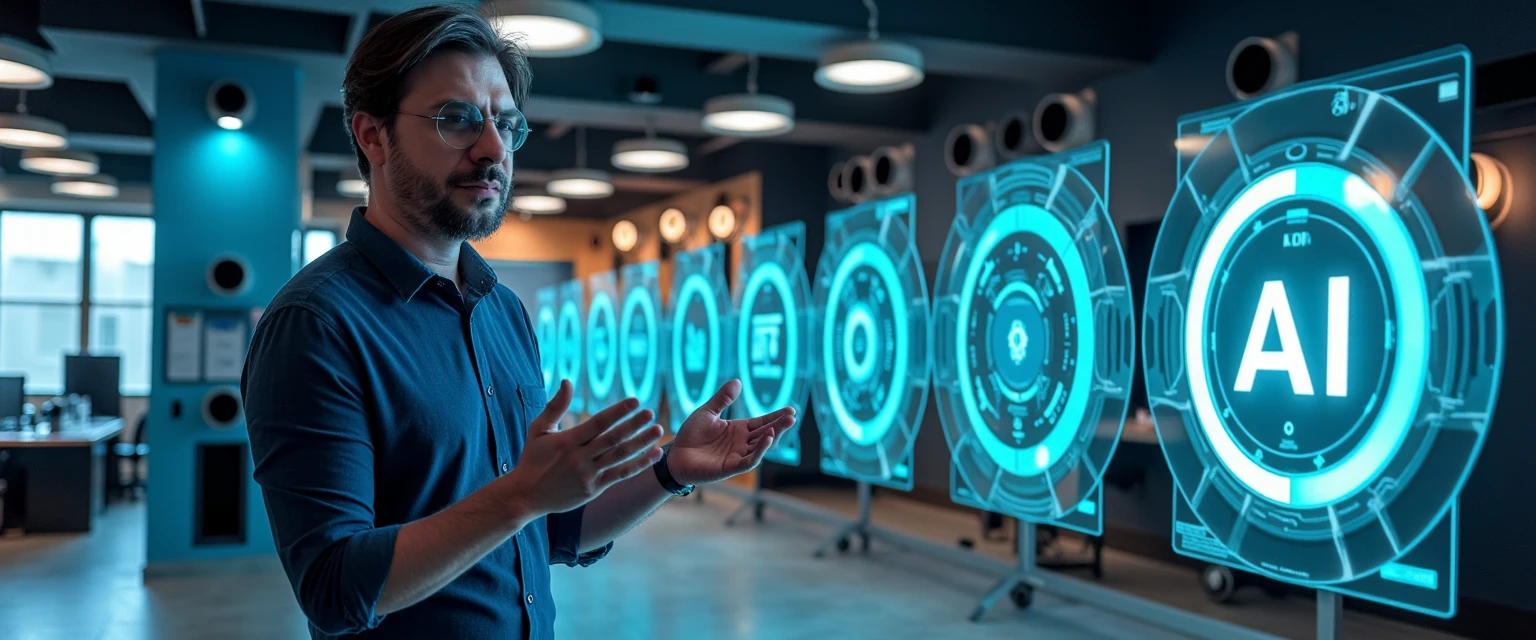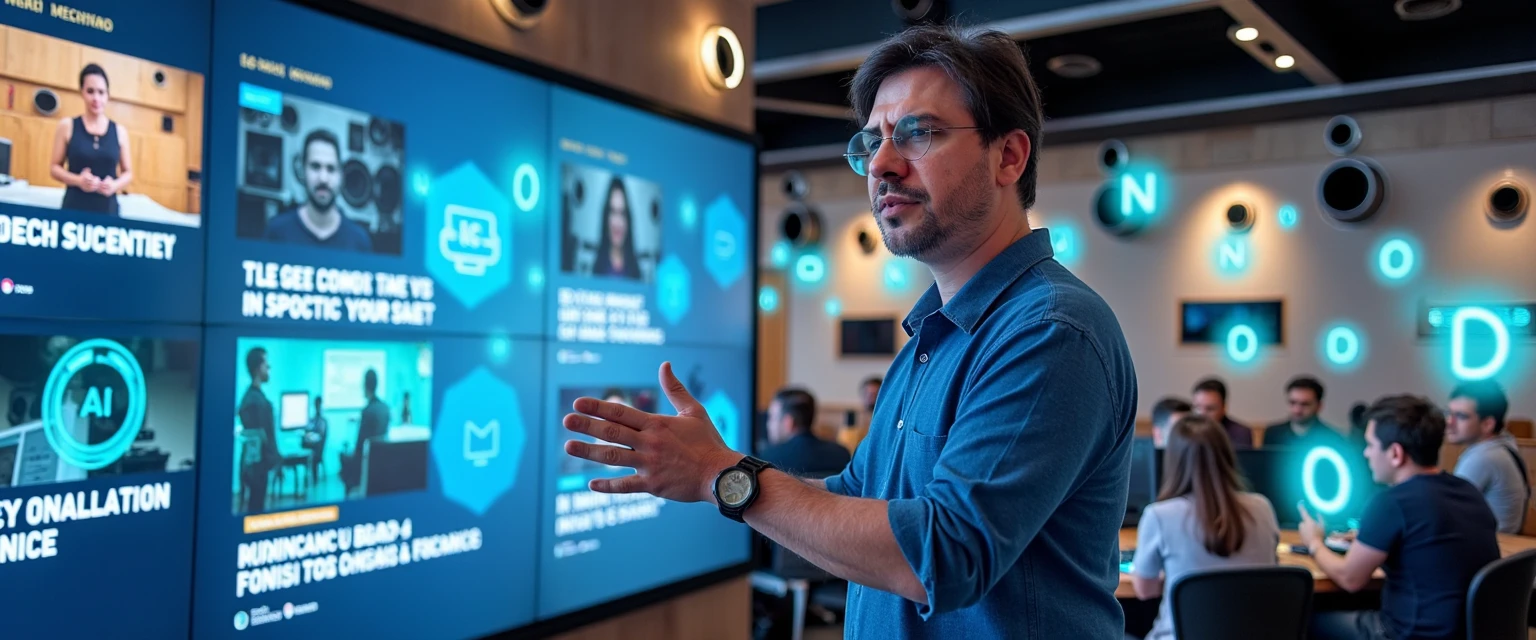AI Radar: Google Steps Up Ad Strategy as 1 in 4 Jobs Will Be Affected – The Last 24 Hours Outlook
May 22, 2025 | by Matos AI

The race for AI dominance intensifies as the job market faces profound transformations
The artificial intelligence scenario over the last 24 hours clearly reflects the moment of acceleration we are experiencing: on the one hand, technology giants are stepping up their efforts to maintain relevance; on the other, international organizations are warning about the impact of technology on the job market. Between opportunities and challenges, Brazil is seeking its path in adopting AI in areas such as public education and business development.
It has never been more crucial to understand what is happening in this technological revolution. Today’s movements will define who will be at the forefront of the digital economy tomorrow. Let’s analyze the main news of the last 24 hours and what they mean for companies, professionals and the Brazilian innovation ecosystem.
Google boosts AI in searches and includes ads to compete with ChatGPT
The Mountain View giant is at a real crossroads. Facing an antitrust lawsuit in the US and growing competitive pressure from Microsoft with Bing powered by ChatGPT, Google announced the inclusion of ads in its new AI-powered search tool, AI Mode.
Join my WhatsApp groups! Daily updates with the most relevant news in the AI world and a vibrant community!
- AI for Business: focused on business and strategy.
- AI Builders: with a more technical and hands-on approach.
Second report from Estadão, the company is intensifying the use of artificial intelligence in its search services to maintain its leading position in the market, implementing functions that optimize the user experience with more personalized results.
THE article from O Globo reveals that advertising, essential to Google's revenue, will be integrated in a less intrusive way, using information generated by AI to concentrate informative content. Vidhya Srinivasan, Google executive, highlighted the importance of advertising innovation in this competitive context.
What we are witnessing is the clash that will define the future of online search. The question we must ask ourselves is: how long will the traditional link-based search model survive? The race to integrate AI into search is not just a question of innovation, but of market survival.
ILO warns: Generative AI will affect 1 in 4 jobs globally
As companies accelerate their adoption of AI, the impact on the job market becomes increasingly tangible. According to a report by the International Labour Organization (ILO), around 25% of jobs worldwide are potentially exposed to generative AI, according to published by G1.
The study reveals that AI will primarily transform administrative professions, with significant disparities between salaries and levels of exposure. The ILO emphasizes the urgent need for the workforce to adapt to the new demands created by technology.
This is not a distant trend, but a developing reality. Organizations that ignore this transformation risk falling behind in competitiveness and relevance. On the other hand, those that anticipate and prepare their employees can convert this challenge into a competitive advantage.
It is worth noting that the impact does not necessarily mean complete replacement, but rather transformation of functions and creation of new opportunities. The central question is: are we adequately preparing our workforce for this transition?
São Paulo innovates with AI in public education
Brazil is beginning to take important steps towards the practical adoption of AI in public services. The government of São Paulo has announced a pilot project that uses artificial intelligence to help correct school lessons, second report by Poder360.
Initially, the technology will help teachers correct essay and objective responses from 8th grade and 1st year high school students, providing feedback on the corrections without directly influencing grades. The initiative mainly aims to relieve teachers' workload, allowing them to focus on activities of greater pedagogical value.
This is a concrete example of how AI can transform essential public services, optimizing resources and potentially improving the quality of education. As I have argued in my lectures on the future of education, we need to rethink the role of educators in the digital age – not replacing them, but enhancing their capacity for impact.
The implementation of technologies like this raises important questions about automation in the educational environment. The challenge will be to find the balance between operational efficiency and preserving the essential human element in the educational process.
Open Source AI: The Engine of Technological Democratization
Amidst the squabbles of large corporations, open-source AI is emerging as a transformative force for the global economy. A study by LF Research reveals that most companies adopting AI use open source solutions mainly due to cost reduction, according to reported by Olhar Digital.
The economic impact combined with productivity gains is generating significant transformations in several industries, especially manufacturing and healthcare. This movement towards democratizing technology allows companies of all sizes to have access to sophisticated tools without relying exclusively on expensive proprietary solutions.
For the Brazilian innovation ecosystem, this trend represents a valuable opportunity. Startups and developing companies can use these technologies to create innovative solutions with reduced initial investment, partially leveling the global competitive playing field.
Microsoft Bets on Autonomous AI Agents as the Next Frontier
While Google is strengthening its core business with AI, Microsoft is moving towards what could be the next revolution in the sector. Microsoft Brazil President Priscyla Laham reported that the company is investing heavily in autonomous AI agents, second information from ISTOÉ Dinheiro.
These agents promise to revolutionize digital interactions, facilitating complex work and operations that require continuous learning. Microsoft is allocating substantial resources to implement and integrate these technologies into its operations.
Imagine virtual assistants that not only respond to commands, but anticipate needs, learn from previous interactions, and perform complex tasks with increasing autonomy. This is the future that is being shaped by autonomous AI agents – a natural evolution of current assistants such as Cortana, Alexa, and Siri.
For Brazilian companies, following this trend will be crucial to maintain competitiveness. Intelligent process automation through these agents can represent significant gains in productivity and innovation in customer service, product development and internal operations.
Between optimism and alarmism: the debate on the risks of AI
The rapid advancement of AI also fuels discussions about its potential risks. A speculative report from the AI Futures Project projects scenarios where AI could surpass human intelligence, leading to potential existential risks, according to report from the Sao Paulo newspaper.
Despite criticism of the extreme nature of their predictions, the authors warn of the urgent need to regulate the technology to avoid unintended consequences. This type of report reflects a school of thought that has been gaining ground in the global debate on AI.
In my view, we need to find a balance between responsible caution and pragmatic optimism. Risk warnings are important to guide the ethical development of technology, but apocalyptic narratives can distract from more immediate and tangible issues, such as technological unemployment, algorithmic biases, and concentration of power.
The challenge for Brazilian society will be to actively participate in this global debate, contributing our unique perspective on how AI should be developed and regulated to benefit the greatest number of people possible.
US ‘boosted’ Huawei’s AI chips with sanctions, says NVIDIA CEO
The geopolitics of AI is taking on increasingly complex contours. NVIDIA CEO Jensen Huang says US sanctions have ultimately driven Huawei to become a powerhouse in AI chips, according to report by TudoCelular.
The executive argues that by restricting sales of advanced chips to China, the US has inadvertently forced a wave of autonomous innovation in the Asian country, changing the competitive balance in the global AI technology market.
This case perfectly illustrates the concept of “evolutionary pressure” applied to innovation: sometimes, constraints and limitations become the catalyst for disruptive technological advances. China, prevented from accessing American technology, has intensified its efforts to develop indigenous alternatives, accelerating its learning and development curve.
For Brazil, this dynamic offers valuable lessons about technological autonomy and the importance of developing local capabilities in strategic technologies. Our dependence on foreign technology puts us in a vulnerable position in a scenario of growing geopolitical tensions.
AI in everyday life: from ChatGPT in the kitchen to business solutions
While we discuss major transformations, AI is already quietly transforming our daily lives. ChatGPT is helping people improve their cooking skills, suggesting recipes and preparation methods based on available ingredients, as TechTudo article.
In the enterprise space, Microsoft is introducing new AI for enterprise products, including Azure AI Foundry and improvements to GitHub, according to CNN Brazil. These tools aim to reduce costs and improve the effectiveness of programming processes.
The widespread adoption of these technologies in everyday and business contexts demonstrates that AI is no longer an emerging technology but an integral part of our lives. The focus is no longer on “if” we will use AI, but “how” we will use it to maximize benefits and minimize risks.
What can we expect in the coming months?
News from the last 24 hours reveals trends that are expected to intensify in the coming months:
- The competition between Google and Microsoft/OpenAI will continue to be fierce, with new AI capabilities being released at a rapid pace
- The debate on the impact of AI on the job market will take on new contours, with more concrete data on affected sectors
- We will see more initiatives to apply AI in public services in Brazil, especially in education and health.
- Open source AI will continue to grow as an alternative to proprietary solutions
- Autonomous AI agents will start appearing in more commercial products
- Regulatory debate will intensify globally, with possible advances in regulatory frameworks in Brazil
How to prepare for this changing scenario?
Given this scenario, some recommendations for companies and professionals:
- Try and learn: test AI tools available in your industry to understand potential applications
- Develop hybrid skills: combine technical knowledge with creative and socio-emotional skills
- Follow trends: stay up to date on AI advances relevant to your field
- Prioritize ethics and transparency: develop responsible practices in the use of data and algorithms
- Collaborate and share: participate in communities of practice and knowledge exchange on AI
The speed of technological transformation demands adaptability and continuous learning. In my work with startups and companies undergoing digital transformation, I have observed that the organizations that thrive are those that cultivate a culture of agile experimentation and constant learning.
In my mentoring sessions, I help entrepreneurs and executives develop a strategic vision on how to incorporate AI into their businesses in a responsible and effective way, identifying opportunities for innovation and anticipating challenges. The key is to balance technological ambition with clear human purpose.
The future of AI in Brazil will depend on our collective ability to transform these technologies into tools to solve our most pressing social, economic and environmental challenges. This is the true transformative potential of artificial intelligence – not just automating what we already do, but helping us do what we cannot yet do.
✨Did you like it? You can sign up to receive 10K Digital's newsletters in your email, curated by me, with the best content about AI and business.
➡️ Join the 10K Community here
RELATED POSTS
View all



